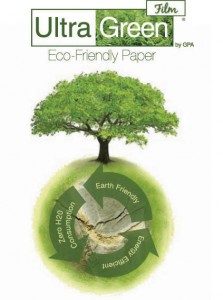As more and more print buyers begin to look for environmentally friendly paper and substrates,

As more and more print buyers begin to look for environmentally friendly paper and substrates, tree-free papers are becoming a more realistic alternative.
In July,
Margie Dana's article "
Blood From a Stone? Never! But You Can Get Paper" appeared on
WhatTheyThink and introduced us to paper made of rock. Margie identified three companies manufacturing this tree-free paper, you can learn more about the products she mentioned here:
A major provider of papers and printable substrates,
GPA, is now offering
Ultra Green Film®, which is manufactured without the use of trees, water or toxic agents including bleaching chemicals. Instead, the paper is limestone-based, made of mineral powders bound together with small amounts of high-density polyethylene and a non-toxic resin.
Although this product is referred to as "paper," the "film" in its name is probably more descriptive of the product.
According to GPA, the film has no grain resulting in a smooth surface that promotes high color saturation and resolution. Ultra Green is naturally resistant to scuffing, water, grease and oily substances, making it ideal for outdoor applications. Due to its distinctive characteristics, it is also resistant to ultra violet rays, therefore it will not yellow or become brittle in the sun.
Shirley Siluk Gregory, in her article for EcoLocalizer, gives us a few more details:
“It combines the printability of a traditional paper product with the durability of a plastic sheet,” says Carl Blase, CEO of Print Art Inc., a printing company in Egg Harbor Township, New Jersey, that began using the GPA paper this summer.
Print Art says replacing one ton of regular paper with GPA’s green version would save 20 trees and 25 million BTUs of energy while also eliminating 236 pounds of air pollution, 167 pounds of solid waste and 42 pounds of water pollution. It would also cut water consumption by 7,480 gallons.
"Paper" made from rock is just one of many tree-free papers. To learn more about other alternatives, visit Conservatree and read their Paper Listening Study about the pros and cons of tree-free papers.
 As more and more print buyers begin to look for environmentally friendly paper and substrates, tree-free papers are becoming a more realistic alternative.
In July, Margie Dana's article "Blood From a Stone? Never! But You Can Get Paper" appeared on WhatTheyThink and introduced us to paper made of rock. Margie identified three companies manufacturing this tree-free paper, you can learn more about the products she mentioned here:
A major provider of papers and printable substrates, GPA, is now offering Ultra Green Film®, which is manufactured without the use of trees, water or toxic agents including bleaching chemicals. Instead, the paper is limestone-based, made of mineral powders bound together with small amounts of high-density polyethylene and a non-toxic resin. Although this product is referred to as "paper," the "film" in its name is probably more descriptive of the product.
According to GPA, the film has no grain resulting in a smooth surface that promotes high color saturation and resolution. Ultra Green is naturally resistant to scuffing, water, grease and oily substances, making it ideal for outdoor applications. Due to its distinctive characteristics, it is also resistant to ultra violet rays, therefore it will not yellow or become brittle in the sun.
Shirley Siluk Gregory, in her article for EcoLocalizer, gives us a few more details:
As more and more print buyers begin to look for environmentally friendly paper and substrates, tree-free papers are becoming a more realistic alternative.
In July, Margie Dana's article "Blood From a Stone? Never! But You Can Get Paper" appeared on WhatTheyThink and introduced us to paper made of rock. Margie identified three companies manufacturing this tree-free paper, you can learn more about the products she mentioned here:
A major provider of papers and printable substrates, GPA, is now offering Ultra Green Film®, which is manufactured without the use of trees, water or toxic agents including bleaching chemicals. Instead, the paper is limestone-based, made of mineral powders bound together with small amounts of high-density polyethylene and a non-toxic resin. Although this product is referred to as "paper," the "film" in its name is probably more descriptive of the product.
According to GPA, the film has no grain resulting in a smooth surface that promotes high color saturation and resolution. Ultra Green is naturally resistant to scuffing, water, grease and oily substances, making it ideal for outdoor applications. Due to its distinctive characteristics, it is also resistant to ultra violet rays, therefore it will not yellow or become brittle in the sun.
Shirley Siluk Gregory, in her article for EcoLocalizer, gives us a few more details:














